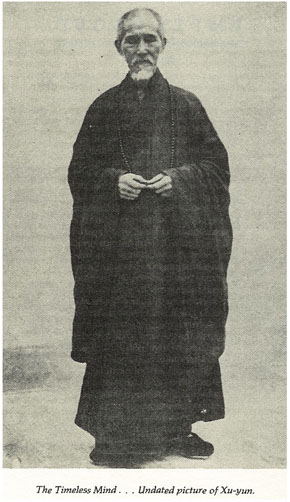The Awakening of Master Xu Yun

“…I bled continuously. Waiting for my end, I sat firmly in the meditation hall day and night with increasing zeal. In the pure single-mindedness of my meditation, I forgot all about my body and twenty days later, my illness vanished completely. When the abbot of Cai-shi Jetty came with an offering of garments for the assembly, he was reassured and delighted to see that my appearance was radiant. He then spoke of my fall into the river and all the monks held me in great esteem. I was thus spared the trouble of working in the hall and could continue my meditation.
Henceforth, with all my thoughts brought to an abrupt halt, my practice took effect thoughout day and night. My steps were as swift as if I were flying in the air. One evening after the set meditation period, I opened my eyes and suddenly perceived a great brightness similar to broad daylight wherein everything inside and outside the monastery was discernible to me. Through the wall, I saw the monk in charge of lamps and incense urinating outside, the guest-monk in the latrine, and far away, boats plying on the river with the trees on both its bank – all were clearly seen. It was just the third watch of the night when this happened.
The next morning, I asked the incense-monk and guest-monk about this and both confirmed what I had seen the previous night. Knowing that this experience was only a temporary state I had attained, I did noy pay undue regard to its strangeness.
In the twelfth month during the third night of the eighth week set for training, an attendant came to fill our cups with tea after the meditation session ended. The boiling liquid accidentally splashed over my hand and I dropped the cup which fell to the ground and shattered with a loud report ; instantaneously, I cut off my last doubt about the Mind-root and rejoiced at the realisation of my cherished aim.
Empty Cloud – The autobiography of the Chinese Zen Master XU YUN
The book is available on the net here
Extrait d’enseignement :
« Dans notre école, l’enseignement consiste en la vision directe de notre essence propre, que les mots et les phrases ne peuvent exprimer. […] Cependant, à cause de notre nature inférieure, les anciens maîtres furent obliger d’user d’artifices pour instruire leurs disciples et leur donnèrent à méditer des phrases particulières appelées hua tou. Et comme les adeptes de la Terre Pure qui récitaient le nom de bouddha était nombreux, ils leur donnèrent à méditer le hua tou suivant : « Qui récite le nom du Bouddha ? » […] Dans notre investigation du hua tou, le mot « qui » doit être soigneusement examiné. […] Vous devez vous efforcer de connaître d’où vient ce « qui » et à quoi il ressemble. Notre investigation doit être tournée vers l’intérieur et pour cela elle est aussi nommée l’écoute intérieure de notre nature propre. »
Source : Tsun Yun, le moine aux semelles de vent par Eric Sablé
